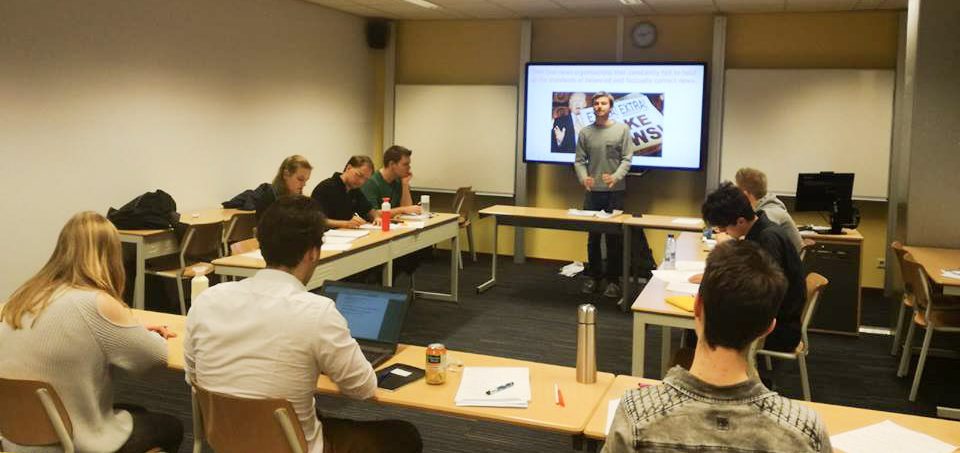Who are we?
Student Debating Society Trivium is an active and enthusiastic society for students in and around Nijmegen. Some join us to (learn how to) debate, others simply because they enjoy the company of our members. Trivium proves to be both a useful as well as just a fun student society to join!
The debate topics range widely: from science, politics and culture to the medical, ethical, socio-economic and philosophical questions. Think of any topic and you can almost be assured there has been a debate about it. These debating nights usually end up with a drink at our pub of choice, Café the Kluizenaar. We’re usually there around 10 pm.
Trivium joins national ánd international tournaments to verbally feud with debaters from other societies. We also organise our own yearly tournament, where debaters from all over the Netherlands are welcome to a battle of wits and arguments on our own field.
Apart from debating and drinking, we have committees as well. They are responsible for a lot of things: from organising dinner parties to an educational night and from a games night to organising our tournament. For beginning debaters, it’s also possible to join one of our beginner’s courses.
So is your interest sufficiently piqued? Come join us for one of our debating nights! It’s perfectly fine to simply walk in, but it’s also fine to contact us first if you’d like. If your interest is in having a drink with us, meet us at the Kluizenaar. You’re free to simply join whenever you wish!
Are you somebody who doesn’t want to become a member, but would like to use our services? We offer workshops and moderation for debates to (student) organisations, secondary schools, political parties, companies and events. Click here to read more about our courses for schools, organizations and students.
Our debate nights
Every Tuesday night is debating night! At 5.45 PM. the first members gather in the Refter to have diner together, and at 6.45 PM we start debating. We usually do one BP and one AP debate on an evening, but one of these debates are regularly replaced by a training to develop more skills or learn about a new topic. Most of our debate nights are in English, so you can join regardless of whether you speak Dutch or not. If possible, we do try to create one Dutch room with the people who would rather debate in Dutch.
Fifteen minutes before starting the debate, the motion and composition of the teams are announced. Everyone gets to hear in which team they are, whether they have to attack or defend the motion, and who the judges are. The teams have 15 minutes to prepare, and then the debate can begin!
After the debate, the judges present the results of the debates. They do not only announce who won, but also give feedback to improve your debating skills. After two rounds of debating, we head to de Kluizenaar for a drink, often accompanied by fun discussions or good conversations. Of course, nothing is compulsory: it’s also possible to do just one debate, and we also have members that only show up for the drinks in de Kluizenaar!

Interested?
You’re always welcome to come by! If you would like to send us a message, click the button below!
What's debating?
Both in Antiquity and on Medieval Universities, Trivium encompassed the three fine arts: grammar, rhetorics and dialectic. Possess these qualities and you would have been a great debater. Luckily, debating isn’t as dusty anymore as this sounds like. For Trivium, debating means above all a lot of fun!
What is debating?
Simply put, debating is a discussion with rules. During a debate, two or more teams face each other. The moderator announces a motion, that usually has something to do with a societal question. They also decide who is in favour and who is against the motion. The teams, consisting of two or three members, get some time to prepare, and afterwards the debate can begin! The jury will decide which of the teams won. So as a debater, you’ll have to speak convincingly to win over the judges!
Debating formats
On our regular evenings, we debate in one or two of the following formats:
American Parliamentary (AP):
An AP debate consists of two teams of two speakers. All speakers have 5 minutes for a constructive speech, and both teams have one summary speech of 3 minutes. During the constructive speeches, members of the other team are allowed to interrupt between the first and last minute.
British Parliamentary (BP):
A BP debate consists of 4 teams, of which 2 teams are in favour and 2 teams are against the motion. Each team consists of two speakers. In the first half the debate is set up, and the second half consists of an extension of the debate and a conclusion. Each speaker gets 5 or 7 minutes time for their speech. During all speeches, members of the opposing teams can interrupt between the first and last minute of the speech.
World Schools Debating Championships (WSDC):
A WSDC debate consists of two teams of three speakers. All speakers get 5 minutes for their speech, and the first or second speaker gets 3 minutes for a concluding speech to round up the debate. Members of the opposing teams can interrupt during the first three speeches.
Get ready to debate!
Besides our regular debating nights, we also debate at tournaments organised by other debating societies throughout the year, to seek out the real competition! We also regularly participate in international tournaments and once a year we even participate in the European Championships (EUDC). These tournaments are not only great to develop your debating skills, but also just a lot of fun!
Are you our next top debater? Come join us and find out!
